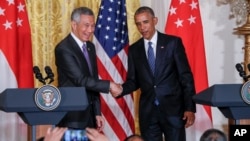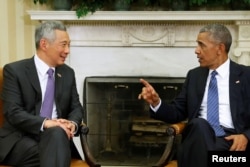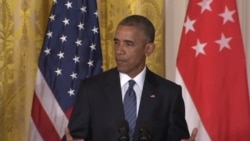President Obama and Singapore's Prime Minister Lee Hsien Loong restated their commitment to passing the controversial Trans-Pacific Partnership.
At the White House Tuesday, Obama and Lee discussed the Trans-Pacific Partnership (TPP), 12-nation trade pact that is currently stalled in Congress.
“The answer cannot be to back away from trade in the global economy," Obama said Tuesday. "It is here to stay. It’s not possible to cut ourselves off given how integrated our economies are. Trying to pull up a drawbridge on trade would only hurt us and hurt our workers. So the answer is to make sure that globalization and trade is working for us not against us. That’s why today we are reaffirming our commitment to the Trans Pacific Partnership. I am a strong supporter of TPP.”
"We hope, and I know the president shares this hope, that Congress will ratify the TPP soon," Lee said.
During remarks at the U.S. Chamber of Commerce on Monday, Lee said the agreement would give the U.S. better access to markets that make up for 40 percent of the global economy.
To celebrate the 50th anniversary of U.S. diplomatic relations with Singapore, Lee is joining Obama at a state dinner in the White House on Tuesday evening- the first held for a Singaporean leader since 1985.
"We know this has been politically difficult, it's a very tough election year, American people are wary of U.S. global engagement. And economic uncertainty has led to concern about jobs, worries about competition from overseas. These are all understandable, even valid concerns, but we hope that all parties will focus on the longer term bigger picture, because there are no winners, only losers with protectionism,” Lee said earlier when talking about the trade pact.
The countries that are part of the TPP are the United States, Vietnam, Singapore, Peru, New Zealand, Mexico, Malaysia, Japan, Chile, Canada, Brunei, and Australia.
The White House has said the agreement would help further break down global trade barriers, open untapped markets, and grow the economy, while providing an important counterbalance to the growing economic strength of China.
Singapore is heavily dependent on international trade. In 2004, the city state became the first to sign a bilateral free trade deal with the United States.
On Monday, Obama said he is optimistic that Congress will eventually approve the TPP trade deal even though both 2016 presidential candidates, Democrat Hillary Clinton and Republican Donald Trump, oppose it.
Obama, who leaves office next January, offered his prediction Monday in an interview with The Straits Times ahead of Lee’s state visit to Washington.
"The politics around trade can be very difficult — especially in an election year," Obama said. "There are legitimate concerns and anxieties that the forces of globalization are leaving too many people behind — and we have to take those concerns seriously and address them."
WATCH: President Obama on Trade and TPP
Lee said Tuesday morning that Singapore would continue to work with whichever party was elected to the White House this fall, citing "steadfast relations through nine U.S. presidents: five Republican and four Democrat."
But many Democrats and Republicans are concerned the trade deal would send more American jobs overseas and hurt the environment including presidential nominees Hillary Clinton and Donald Trump.
Clinton, as Obama's first-term secretary of state from 2009 to 2013, was a staunch TPP advocate, saying it "sets the gold standard in trade agreements."
But last year, she said the details in the agreement did not meet her standards and turned against it.
Trump has built his support among blue-collar workers by opposing trade deals, the pending Pacific deal, as well as the 1994 North American Free Trade Agreement with Mexico and Canada.








